 Virtual excursion on the city of Smolensk Virtual excursion on the city of Smolensk Smolensk is
one of the ancient Russian towns. Having been founded on the ancient rout «from the
Varangians to the Greeks», it is a contemporary to Kiev and Novgorod. By the time of the
first reference about Smolensk in chronicles of Ustug (863), the town had already been a
great town with plenty of people. The finds in the krivichies' settlements testify about
the antiquity of Smolensk civilization. This settlements are known as burialmounds in
Gnesdovo. As a result of archeological excavations, an earthenware pot with the
super-scription «gorouscha» was found. This superscription means – «mustard». It is
the oldest superscription made before the middle of the X century.
The Smolensk principality reached the apogee of its power in the XII century. Till now
the unique monuments of temple architecture dominates the town. They are: Peter's and
Paul's Churches, the Churches of the St. John the Theologian and of the Archangel Michael.
A power splash in architectural activity was in 1596–1602. These were the years when
the famous Smolensk fortress wall, the creation of the architect Fyodor Kon, was erected.
The Cathedral of the Assumption stands solemnly above the Dnieper Valley. The carved
wooden iconostasis, made from lime and decorated with rich gild, and its numerous icons
are the masterpieces of applied art. The chief sacred thing in the cathedral is the icon
of the Smolensk Virgin Lady Hodegetria. It is the very icon which was in Borodino field
before the famous battle. Kutuzov himself prayed in font of the icon for the win in the
battle. For many centuries Smolensk played an important role in the defense of the Russian
State. In difficult times of Mongolo-Tatar yoke the town Smolensk, «chosen by God»
didn't surrender the enemy. It withstood the lethal onslaught of Lithuanians and Polish
interventions, became a tough nut for Napoleon.
And even during the Great Patriotic War (1941–1945) the town fulfilled its historical
mission as a shield on the way of the German-fascists army, which tried to annex Moscow.
Smolensk got the title of the «Hero-town», which well-deserved crowned its glorious war
history.
Tourists are deeply impressed by Smolensk. They open for themselves the famous pages of
Russian history again and again.
|

The Cathedral of the Assumption, XVIII century
The tower «Kopitskie vorota» of the Smolensk fortress wall
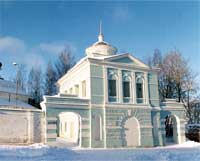
The Church of Virgin Lady Ahtirskaja, XIX century
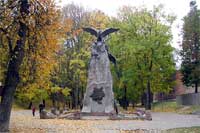
The monument «Grateful Russia to the heroes of 1812»
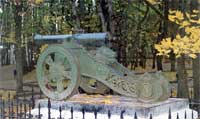
The captured Prussian cannon, XIX century
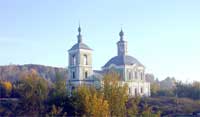
The Church of Vozdvizhenija, the middle of the XVIII century
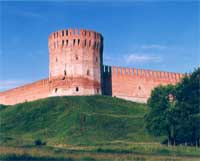
The tower «Eagle» of the Smolensk fortress wall
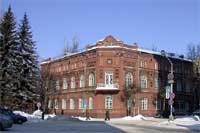
The house of merchant Budnikov, XIX century
|

